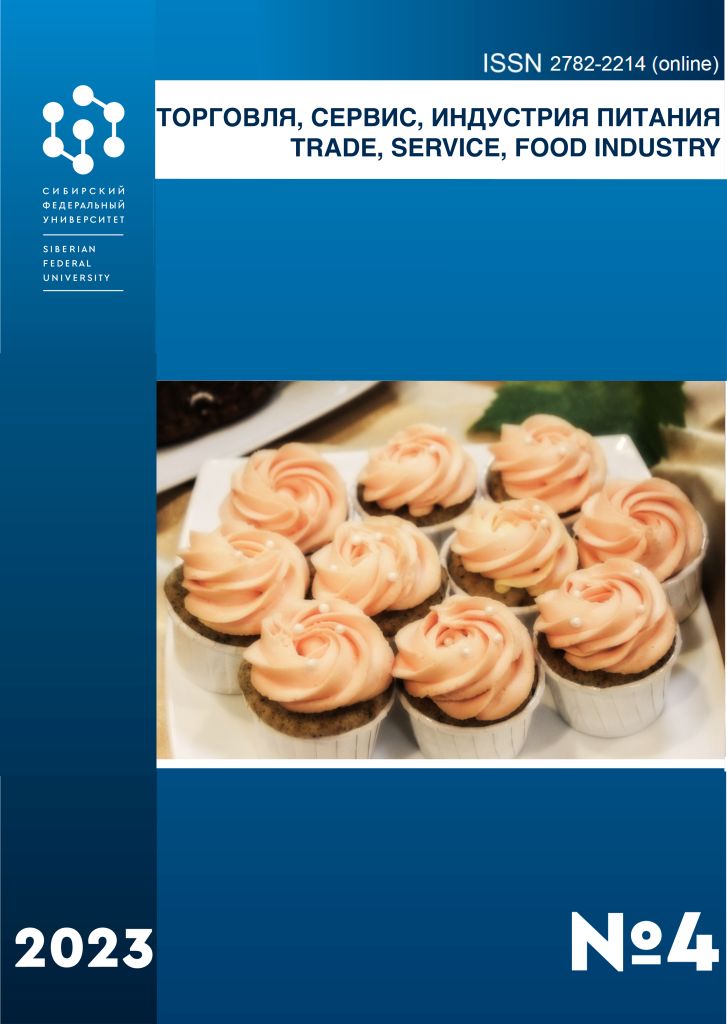from 01.01.2021 until now
Krasnoyarsk, Krasnoyarsk, Russian Federation
from 01.01.2002 until now
Krasnoyarsk, Krasnoyarsk, Russian Federation
from 01.01.2021 until now
Krasnoyarsk, Krasnoyarsk, Russian Federation
from 01.01.2021 until now
Krasnoyarsk, Krasnoyarsk, Russian Federation
UDC 330.341.1
CSCSTI 06.52
Russian Classification of Professions by Education 38.03.01
Russian Library and Bibliographic Classification 653
Russian Trade and Bibliographic Classification 774
The study focuses on progressive digital business trends focused on 2024. The work is based on a detailed analysis of statistical data reflecting the indicators of the use of digital technologies by enterprises in recent years, and the number of specialists with digital competencies. The main research trends cover the introduction of artificial intelligence in customer interaction, the focus on sustainable business, the promotion of digitalization and automation. In the course of the work, attention is drawn to the growing importance of these areas in the modern business world and their impact on the competitiveness of enterprises. The analysis of the results highlights the importance of companies adapting to new digital trends and strategies to ensure sustainable development and efficiency. The article presents valuable conclusions for managers and researchers, as well as organizations seeking to improve their competitiveness and innovation potential in a dynamic digital environment. This abstract presents the main aspects of the study, emphasizing its relevance and value for the academic and business community.
digitalization, information technology, consumer, digital economy, e-commerce
1. Report on the global digital transformation market for 2023. [Electronic source] URL: https://www.reportlinker.com/p06319469/Digital-Transformation-Global-Market-Report.html?utm_source=GNW (Date of access: 01.11.2023).
2. Tapscott, D. (2011). The Digital Economy. John Wiley & Sons Limited (USD), 17-27.
3. Abdrakhmanova, G. I., Gokhberg, L. M., Demyanova, A. V. [et al.]. (2019). Report on the digital economy. - Geneva : UN, 3.
4. Decree of the President of the Russian Federation of May 9, 2017 No. 203 «On the strategy for the development of the information society in the Russian Federation for 2017-2030». [Electronic source] URL: http://www.kremlin.ru/acts/bank/41919 (Date of access: 05.11.2023).
5. Corallo, A., Passiante, G. & Prencipe, A. (2007). The Digital Business Ecosystem. Edward Elgar Pub., 240.
6. Weill, P. (2009). IT Savvy: What Top Executives Must Know to Go from Pain to Gain. Boston : Harvard Business Press, 182.
7. Avdeeva, I. L., Golovina, T. A. & Parakhina L.V. (2020). Digital transformation of economic processes: opportunities and threats. Financial business, 1, 3-7.
8. Medvedeva, L. F. & Arkhipova, L. I. (2021). Digital maturity as a factor of competitive advantage in business. Big Data and Advanced Analytics, 7-2, 86-98.
9. Belyatskaya, T. (2018). Management of the electronic economy. Science and Innovation, 3, 48-55.
10. Berg, T. I. (2023). Digital technologies of trade: trends and prospects. Trade, service, food industry, 3(1), 1-12.
11. Bestuzheva, O. Yu. & Vershinskaya, O. N. (2017). Some features of the development of the digital economy. Energy Policy, 5, 49-57.
12. Lapidus, L. V. (2021). Digital economy: management of e-business and e-commerce. Moscow : INFRA-M, 381.
13. Nagovitsina, L. P. & Schnorr, Zh. P. (2018). Development of digital technologies in modern retail. Bulletin of BUKEP, 5, 9-25.
14. Suchkov, M. A. (2020). Digital management technologies in retail. Economic research and development, 5, 55-59.
15. Passport of the national program «Digital Economy of the Russian Federation». [Electronic source] URL: https://digital.gov.ru/uploaded/files/tsifrovaya-ekonomika-rossijskoj-federatsii.pdf?utm_referrer=https%3a%2f%2fyandex.ru%2f (Date of access: 30.10.2023).
16. Big data and neural networks have increased the efficiency of Magnit. [Electronic source] URL: https://www.retail.ru/news/bolshie-dannye-i-neyroseti-uvelichili-effektivnost-magnita-15-fevralya-2022-213899/ (Date of access: 14.11.2023).
17. Lenta reduced write-offs thanks to artificial intelligence. [Electronic source] URL: https://lenta.com/o-kompanii/news/-----37/ (Date of access: 30.10.2023).
18. Abdrakhmanova, G. I., Gokhberg, L. M., Demyanova, A. V. [et al.] (2021). Russian ICT sector: key indicators for 2022. Moscow : National Research University Higher School of Economics, 1-32.
19. Abdrakhmanova, G. I., Vasilkovsky, S. A., Vishnevsky, K. O. [et al.] (2022). Digital economy. Brief statistical collection. Moscow : National Research University Higher School of Economics, 1-125.
20. Chernyshenko, D. By the end of 2025, «Digital Departments» will graduate over 385 thousand people. [Electronic source] URL: http://government.ru/news/49345/ (Date of access: 30.10.2023).
21. Vysotskaya, E. G. & Ravino, A. V. (2016). Globalization as a cause of modern environmental problems of society. Culture and ecology - the foundations of sustainable development of Russia. Ekaterinburg : UrFU, 169-172.
22. Kolesov, V. A. (2017). Using blockchain technology in the educational process to protect intellectual property. Distance educational technologies, 2, 343-347.
23. Mamedov, D. (2021). Perfectionism and intuition: how the «Golden Apple» switched to e-com development and within a year won leadership in the industry. [Electronic source] URL: https://incrussia.ru/specials/goldapple/ (Date of access: 05.11.2023).
24. Sharypov, A. A. (2022). The concept of sustainable development. [Electronic source] URL: https://spravochnick.ru/filosofiya/koncepciya_ustoychivogo_razvitiya/ (Date of access: 04.11.2023).









